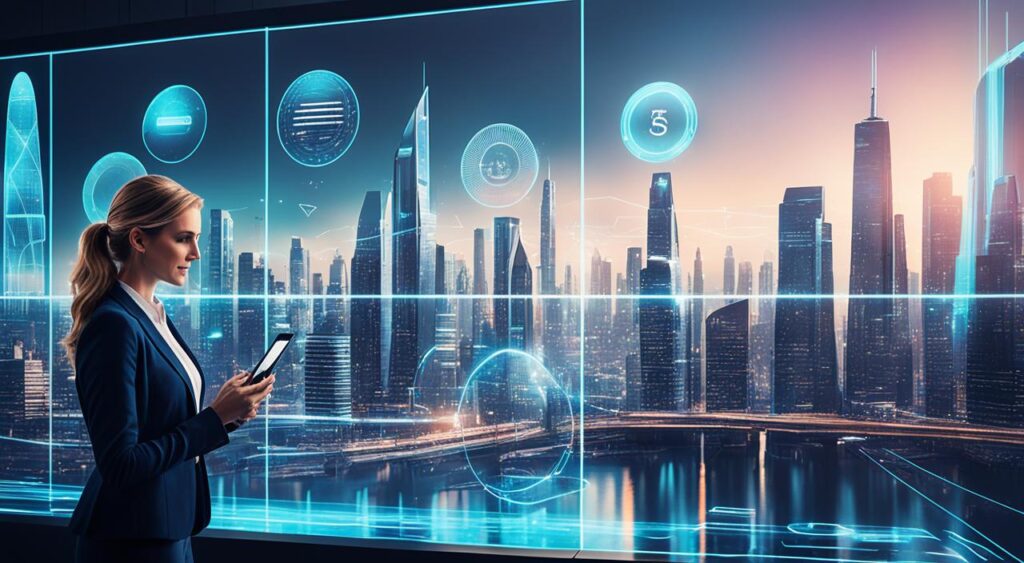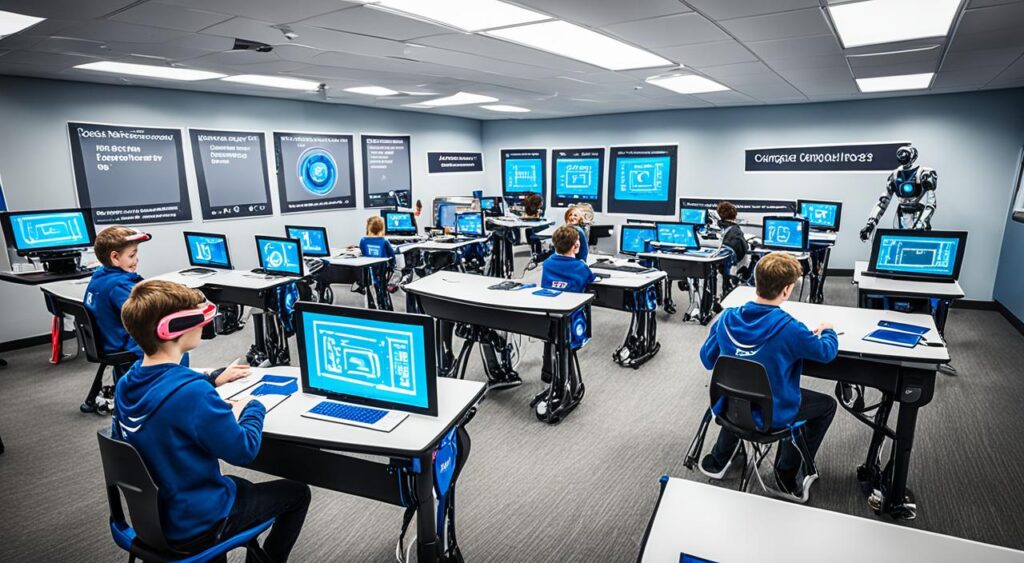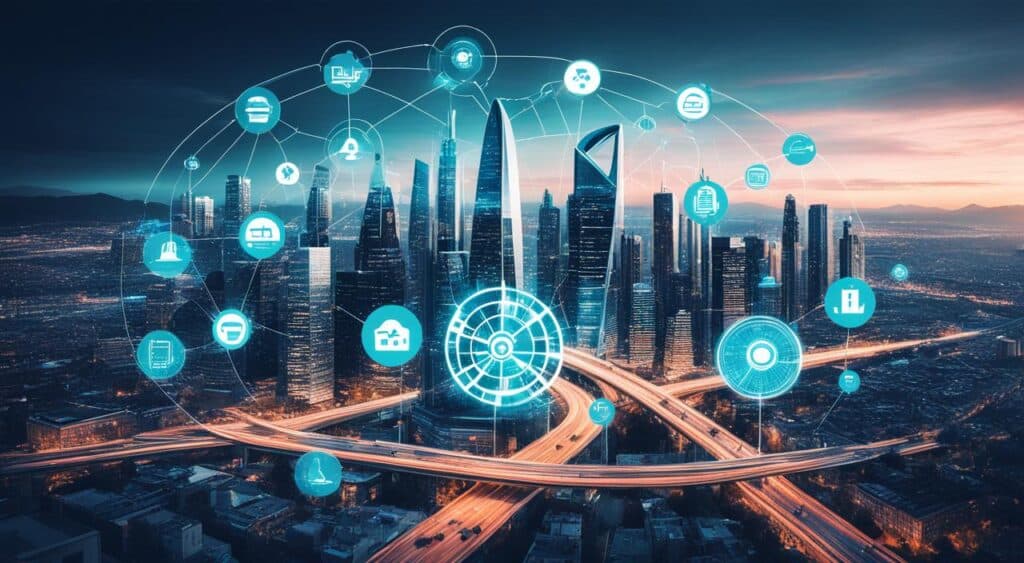Artificial Intelligence Transforming is quietly shaping our world for the better. It’s making our daily tasks simpler and our experiences more tailored. This tech is not just changing the game in technology but also in fields like healthcare and creativity. With every step forward, AI is proving its worth across various areas like finance, security, and transportation.
Experts hail AI as a game-changer, shifting how we process and use information. Already, it’s changing our societies and economies, sparking new discussions. As AI advances, it impacts almost everything, from our jobs to privacy and how we battle climate change.
Machine learning, deep learning, natural language processing, and generative AI are at the heart of this revolution. They’re changing how we engage with technology and data. No matter if AI helps manage tasks, suggests what to watch, or creates art, its presence is remaking our routines in big ways.
Key Takeaways: Artificial Intelligence Transforming
- Artificial intelligence (AI) is quietly revolutionizing everyday life, from streamlining routine tasks to personalizing recommendations.
- AI is transforming various sectors, including healthcare, communication, and creativity, with applications in machine learning, deep learning, and natural language processing.
- As AI continues to advance, its potential to enhance daily experiences is growing exponentially, raising important questions about its impact on society, the economy, and governance.
- The integration of AI into our lives is redefining how we interact with technology, with benefits and challenges that span from business automation to data privacy concerns.
- Understanding the diverse capabilities of AI, from task management to personalized recommendations, is crucial as this transformative technology continues to shape the future of humanity.
Streamlining Routine Tasks
Artificial intelligence (AI) is changing the way we handle daily tasks. The key actors are AI-powered virtual assistants. They help us do our work more efficiently. This lets us give more time and focus to important things.
Also Read : How To Ensure Peace Of Mind With Fine Wine Insurance ?
AI-powered Virtual Assistants
These smart helpers understand what we need by using natural language processing and machine learning. They can manage our schedules, reminders, and to-do lists. This means we don’t have to worry about small details. We can concentrate on the big stuff in our lives.
Also Read : Protecting Your Care Home: Adult Residential Facility Insurance Solutions
Managing Calendars and To-Do Lists
AI learns and grows smarter, always providing the best advice for us. Using cutting-edge technology, they remember our deadlines and tasks. Our virtual assistants fit right into our daily lives, ensuring nothing important slips through the cracks.
Also Read : Exploring Types Of Equipment Breakdown Insurance
Natural Language Processing Capabilities
Thanks to natural language processing, these AI assistants can understand and act on what we say. They’re great for smart homes and smart speakers. This tech lets us organize our lives better. We can manage our time and tasks more easily, anywhere, anytime.
There’s a big push for AI virtual assistants and task management tools. More and more, businesses see how AI can make work smoother. As AI gets better, its impact on our daily lives will only get bigger.
Also Read : Protecting Your Belongings: Self-Storage Tenant Insurance Explained
Personalizing Recommendations
The age of blanket recommendations is ending. Now, artificial intelligence (AI) and machine learning are changing how we experience the online world. They shape everything from what we watch to what we buy. AI systems suggest movies we’d like, recommend products we might love, and show news articles we’re intrigued by. This new tech is shifting how we find and interact with digital content in a more personal way.
Also Read : Exploring Types Of Equipment Breakdown Insurance
Streaming Service Recommendations
Today, streaming platforms use AI and data science to understand our watching habits. They suggest movies and shows they think we’ll enjoy. As we engage more with these services, their recommendations get better. This process makes our time online more enjoyable, fitting each person’s viewing preferences.
Online Retail Suggestions
In the e-commerce world, AI is reinventing the shopping experience. Online stores now offer personalized products that align with our tastes. By looking at what we’ve browsed and bought before, AI knows what might catch our eye. This not only makes us happier as shoppers but also benefits the stores, increasing their online sales.
News and Content Curation
AI is also changing the news we see online. It analyzes what we like to read about and watch. This way, it can show us news and articles we’ll find interesting. Using smart algorithms, these systems make sure we’re always seeing something that appeals to us. This makes our online news experience more fitting to our individual interests.
Revolutionizing Healthcare

Artificial intelligence (AI) is changing how healthcare works. It brings a new age of personalized and smart healthcare that helps patients better manage their health.
Wearable Devices with AI Algorithms
Wearable devices are getting smarter thanks to AI. These devices can track your health signs and predict when you might get sick. This way, they give you tips on staying healthy in real time.
Telemedicine and Remote Consultations
AI is making healthcare services more available through telemedicine. This uses AI and special programs to let patients see doctors remotely. It makes getting medical advice easier and expands healthcare’s reach, even to faraway places.
AI helps doctors spot health trends from big sets of data. This makes them better at predicting illnesses and managing chronic diseases. Its role in healthcare is only getting started as it continues to grow.
Enhancing Communication

Artificial intelligence (AI) changes how we talk, making it simpler and smashing language walls. It does this from checking emails to helping out customers. AI makes talking better at every step.
Email Categorization and Prioritization
AI tools are reshaping how we handle emails. They use natural language processing and machine learning to sort and rank messages. These systems look at what emails say, who they’re from, and how we typically react. This way, they put the important stuff upfront and keep the junk away.
Chatbots for Customer Support
AI chatbots are everywhere, chatting with us on websites and social platforms. They’re great for instant customer support. These smart helpers understand what we ask, provide helpful answers, and can even get help from a real person if things get too tricky. They make customer service better overall.
AI-powered Language Translation
AI-powered translation tools remove the hurdle of different languages. They use fancy machine learning to change text, speech, and even sign language. This makes it easy to talk to anyone, anywhere, and encourages working across borders.
The more AI grows, the more it will change how we talk for the better. It helps us work smarter, connect with others more effectively, and brings people together, no matter the language or culture.
Elevating Creativity

Artificial intelligence (AI) does more than ease boring tasks. It boosts creative work too. With the help of AI, photo editing applications can suggest edits that match your style. This improves the photo editing and image enhancement experience.
In the same way, music composition tools are creating original melodies from user input. This motivates both musicians and beginners to try new artistic ideas in music composition and melody generation. The power of AI is making artistic expression and the creative process richer, letting people dive into self-expression and find new paths for artistic collaboration.
The use of artificial intelligence, machine learning, and generative AI keeps growing. It’s clear these technologies can elevate creativity in many fields. Whether it’s improving the visual arts or sparking new music, AI-driven creative tools are reshaping the creative field.
Artificial Intelligence
The world of artificial intelligence (AI) is constantly advancing. Its power to impact our lives is growing. It’s seen in smart homes, self-driving cars, and helping supply chains predict needs. AI changes how we use technology in our everyday lives.
Smart Home Automation
AI is now part of our homes, making everything just right. It adjusts lights, temperature, and security to suit us. This not only saves energy but also makes life easier and more customized thanks to its learning abilities.
Autonomous Vehicles
Self-driving cars are a big part of AI in action. They use sensors, smart algorithms, and predictions to move safely. These cars understand the road, traffic, and can make quick decisions. They aim to make our travels safer and without human errors.
Predictive Analytics in Supply Chains
In business, AI helps move products more efficiently and with less waste. By looking at a lot of data, it predicts what people will need. This helps avoid delays and waste, getting products to customers at the right time. It improves how goods are moved, making things better for the planet and consumers.
AI Applications Across Sectors

Artificial intelligence (AI) is changing many industries. It’s used in finance, national security, and the legal system. AI uses machine learning and data analytics. It also relies on advanced algorithms to bring new innovations. It helps make better decisions in different fields.
Finance and Investment Management
In finance, AI is shaking things up through “robo-advisers.” These use data to offer personalized investment advice. They find the best trading decisions faster than people. AI also fights fraud by spotting unusual activities in financial systems.
National Security and Defense
The military is using AI to improve national defense. It sifts through large amounts of data and video from drones. This helps find threats and targets quickly. By automating these tasks, AI boosts security efforts.
Criminal Justice and Law Enforcement
In criminal justice, AI is also a game-changer. It helps predict where crimes might happen. This allows police to act before crimes occur. AI also makes crime investigations better with tools like facial recognition.
As AI grows, it will change industries even more. It’s already impacting finance, security, and the law in big ways. Bringing AI into these areas will help us make better choices, be more efficient, and keep people safe.
Ethical Considerations

As artificial intelligence (AI) becomes more common, we must be careful in its use. It’s important to think about morals when using AI. This involves looking at data privacy and security, algorithmic bias and fairness, and the role of human oversight and control.
Data Privacy and Security
AI systems need lots of data to learn. This raises data privacy worries. Keeping data safe from those who shouldn’t see it is crucial. Leaders and policymakers need to create strong rules. These rules should protect our data and make sure AI is used fairly.
Algorithmic Bias and Fairness
AI can highlight unfairness if not designed well. It’s key to make AI systems fair and transparent. To do this, we must check for biases in the formulas used. We should also make sure the data used is varied. Plus, we need to hold AI accountable for its decisions.
Human Oversight and Control
Despite its power, AI should assist us, not lead us. It must have human oversight. This means people should make the final decisions. We need to keep humans involved to handle AI in the right way. That’s the key to using AI well and fairly.
AI Workforce and Education

Artificial intelligence is changing many fields. This change affects jobs and the skills we need. It’s important that we teach everyone about digital education and AI literacy. With AI, some jobs may change. This creates a skills gap. To fix this, we need to help people learn new skills all their lives.
Retraining and Upskilling Workers
If AI and automation change your job, there’s a solution. Companies should help their workers learn new things. They can do this through retraining and upskilling programs. These programs teach people about digital literacy. They also help them get new technical skills. This way, they can keep up with changes and do well in today’s job world.
Digital Education and AI Literacy
It’s not just about workers. Students also need to learn new skills. We should change how we teach to include AI education and technology education. Everyone, from young children to adults, should understand technology. This will help them adapt to the AI revolution when they grow up.
By closing the skills gap and teaching digital education, we can make people ready for artificial intelligence. This way, everyone can enjoy the good things AI brings to our society fairly.
Regulatory Landscape

Artificial intelligence (AI) is getting more and more into our daily lives. This makes having strong rules very important. Governments all over the world are working hard to make rules that balance the good of AI with its challenges.
Government Policies and Guidelines
The US government, led by President Biden and Vice President Harris, is making special rules for AI. They created an AI Bill of Rights to ensure data privacy and prevent unfair AI decisions. This shows how important AI ethics have become at the top level.
States and local governments are also getting into this. They are working with experts to make rules that fit different areas like health, money, and travel. These rules help deal with the specific issues AI brings.
Industry Standards and Best Practices
Not just governments, but companies and groups are setting their own rules too. The Institute of Electrical and Electronics Engineers (IEEE) and Partnership on AI are working on this. They aim to make AI safe, fair, and private for everyone.
This effort from companies is pushing for better self-regulation. It makes AI businesses focus on doing good for their users. Following these standards does more than show good will. It also helps them earn trust from others.
Also read: Top Software Development Tools & Solutions 2024
Conclusion
Artificial intelligence is changing how we use technology every day. It’s more than a trend; it’s a big shift. AI makes our tasks easier, gives us personalized experiences, and improves many sectors like health and communication. These changes are making life more comfortable and tailored for everyone.
But, we also need to be careful. We must think about the ethics of AI. Using it the right way will help us all. Laws, rules, and learning about AI are important. They guide us to use AI in a good way for society and work.
The future with AI is bright. But, we need to be smart about it. We should make AI in a way that’s fair and respects people’s privacy. This will help us all live better and make the world a better place.
FAQs
Q: What is Artificial Intelligence (AI) and how does it work?
A: Artificial Intelligence (AI) is a branch of computer science that aims to create intelligent machines capable of performing tasks that typically require human intelligence. AI works by processing large amounts of data and using algorithms to recognize patterns and make decisions based on that data.
Q: What are the different types of Artificial Intelligence?
A: There are mainly two types of AI: Weak AI, also known as Narrow AI, which is designed for a specific task, and Strong AI, also known as Artificial General Intelligence (AGI), which can perform any intellectual task that a human can.
Q: How is Machine Learning related to Artificial Intelligence?
A: Machine Learning is a subset of AI that focuses on developing algorithms and statistical models to allow computers to learn from and make predictions or decisions based on data, without being explicitly programmed.
Q: What are some examples of AI technologies being used in everyday life?
A: Examples of AI technologies include virtual assistants like Siri or Alexa, recommendation systems in online shopping platforms, facial recognition systems, autonomous vehicles, and spam email filters.
Q: What are some benefits of using Artificial Intelligence?
A: Some benefits of AI include increased efficiency in performing tasks, automation of repetitive tasks, improved decision-making based on data analysis, enhanced customer service through chatbots, and advancements in healthcare and medicine.
Q: How does Deep Learning differ from traditional Machine Learning?
A: Deep Learning is a subset of Machine Learning that uses neural networks with multiple layers to process data and extract features. It is capable of learning complex patterns and has been particularly successful in tasks like image and speech recognition.
Q: What is the history of Artificial Intelligence?
A: The history of AI dates back to the 1950s when the term was first coined. Over the years, AI research has evolved with significant milestones and advancements, leading to the development of various AI technologies we see today.


